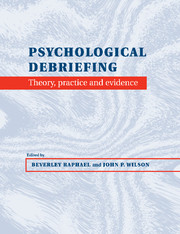Book contents
- Frontmatter
- Contents
- List of contributors
- Introduction and overview: Key issues in the conceptualization of debriefing
- Part I Key conceptual framework of debriefing
- Part II Debriefing: models, research and practice
- Part III Adaptations of debriefing models
- 16 Delayed debriefing: after a disaster
- 17 Debriefing in different cultural frameworks: responding to acute trauma in Australian Aboriginal contexts
- 18 The concept of debriefing and its application to staff dealing with life-threatening illnesses such as cancer, AIDS and other conditions
- 19 Traumatic childbirth and the role of debriefing
- 20 Debriefing health care staff after assaults by patients
- 21 Multiple stressor debriefing as a model for intervention
- Part IV Debriefing overview and future directions
- Conclusion: debriefing – science, belief and wisdom
- Index
17 - Debriefing in different cultural frameworks: responding to acute trauma in Australian Aboriginal contexts
from Part III - Adaptations of debriefing models
Published online by Cambridge University Press: 06 January 2010
- Frontmatter
- Contents
- List of contributors
- Introduction and overview: Key issues in the conceptualization of debriefing
- Part I Key conceptual framework of debriefing
- Part II Debriefing: models, research and practice
- Part III Adaptations of debriefing models
- 16 Delayed debriefing: after a disaster
- 17 Debriefing in different cultural frameworks: responding to acute trauma in Australian Aboriginal contexts
- 18 The concept of debriefing and its application to staff dealing with life-threatening illnesses such as cancer, AIDS and other conditions
- 19 Traumatic childbirth and the role of debriefing
- 20 Debriefing health care staff after assaults by patients
- 21 Multiple stressor debriefing as a model for intervention
- Part IV Debriefing overview and future directions
- Conclusion: debriefing – science, belief and wisdom
- Index
Summary
EDITORIAL COMMENTS
This chapter presents, clearly and intensely, a description of chronic traumatization and its effects, over many generations, and in many different forms, for Australian Aboriginal peoples. The past chronic and repetitive nature of such traumatization, and the fact that Aboriginal peoples are currently still not secure and safe for recovery highlights the complexity of any healing processes. As Ober et al. powerfully attest it is simplistic to suggest that acute trauma, when superimposed on this situation, is readily soluble by a shortterm intervention according to a Western Model such as debriefing.
While this chapter reflects one indigenous culture, the themes therein are reflected in many others, particularly those ‘First Nations’ where there have been discrimination, attempts at assimilation and chronic traumatization and disadvantage. High rates of child abuse, drug and alcohol problems, premature mortality, suicide and mental health problems have all been reported in studies of Native American Indian and Alaska Native communities (Manson et al., 1982). They continue to be an important focus for prevention, and for treatment approaches.
An environment supporting indigenous populations so that they can take the necessary steps for recovery is the first essential. This must recognize and acknowledge the extent and contexts of traumatization and their contribution to the very adverse state of Aboriginal physical and emotional health and well-being. In addition, communities must be supported to build culturally appropriate models for healing.
Keywords
- Type
- Chapter
- Information
- Psychological DebriefingTheory, Practice and Evidence, pp. 241 - 253Publisher: Cambridge University PressPrint publication year: 2000
- 4
- Cited by

